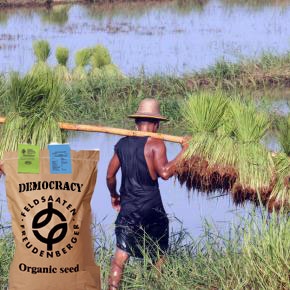
An article in The Christian Science Monitor reported that
some Burmese peasants believe democracy is something to eat.
When the students told us about this plant a few months ago, they were not sure precisely what it was either, but they said it will change our lives. They’d heard it will make hair grow on bald heads. People who eat it must battle to keep from wearing a silly smile, they like it so much. The soil gets better when it grows there. The produce is at chest and stomach level so when you pick, you don’t have to stoop or reach; yet the rest of the plant can be eaten, root, leaves, and all, if you like. It tastes wonderful, they said.
The students said some American farmer created it there. He spent years saving seeds, studying hybrids, conducting extensive experiments to make an ancient and forgotten crop suitable for their soil. He developed a strain with high yields and hardiness that doesn’t require too much fertilizer, though we have heard the rich Americans have a great deal of fertilizer.
We started wondering, what sort of food is it? Is it something that requires great delicacy to cook, made with just the right ingredients and amounts, the right knowledge, actions, and weather? Or must you simply have certain key ingredients, and then you can do as you please: make a stew or fry it, grease the dish or not?
When we first heard of it, we wondered if it would be hard to grow. What sorts of beetles would we have to pick off of it? Would it grow with our usual fertilizer, or must we add bone meal? Everyone was so excited about it; we thought there must be remarkable yields, and it must taste delicious. We had dreams about the taste. Is it powerful, like chilis, tangerines, tea, allspice? Or is it a marvelous staple, like rice, potatoes? One of us dreamed it is a new fowl, a large chicken with a bald head, that grows incredibly fat eating sawdust and potato beetles. How strange that the students heard about it first. Some professor in the college of agriculture must have read a Western book.
It is most confusing, for now we hear the opposite from our cadres. The students don’t come anymore, and the cadres say this crop was sent by murdering CIA scientists. Eating it will make you sterile, or, if you eat just a little, you will never have any children but girls. It will pierce your bowels; your soil will lose its sweetness; locusts can smell this stuff a thousand miles away, and it draws them like a magnet. If it begins to grow, soon it will cover everything, like kudzu: it will steal fields and pastures and forests.
Once you know it, you will pick it from your weeds to keep it from hurting the weeds. This is not a food; it is a poison. If you see even a shoot, burn it, burn the plants around it, even if they are wheat or rice. Any animal that eats this plant, you must slaughter it and incinerate the body, taking careful hygien¬ic precautions. No one is to eat of the animal that eats of the plant, nor eat an animal that eats such an animal, not even the dog or monkey.
This western dish, they tell us, doesn’t agree with our insides — worse than cheese or milk. Remember the foolish city people who tried to follow the Western fad, to be so “modern” eating ice cream? Their doctors can tell you how it was for them when that “delicacy” caught sideways in them.
One old man, U Bing, walked to the library in Kangat to ask. The librarian said the cadres were right. He said many had died in the city because of the poisoning, screaming in agony for hours as they died. U Bing felt this man had a gnat in his eye, for he blinked a great deal, sitting at his desk. This librarian said the army had to be called in to help the doctors tend the sick, and to stack the bodies. Then the soldiers helped by going to all the restaurants and markets to make sure that none was left to poison the people. So conscientious were they, they would search out people who might have some in their homes, then rush to the houses to warn these people and collect the poison before it was too late.
Those who sold and bought it in ignorance were not punished, but those who knew the harm it would do, those conspirators, have been shot. We see them on the television at our mayor’s house, their faces pale, and hear they have paid for their crimes. Though this is all confusing for us, we are so glad that this awful stuff was stopped before it came here. Still, it would have been interesting to see what it looks like, and, of course, one wonders what the taste was — if just one bite to get the flavor would have hurt so much.
The village council met last night to discuss next year’s crops. Again this year, we will concentrate on rice and fish, growing for market a few tomatoes, a flock of turkeys, some pumpkins, and yellow corn.

